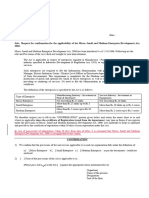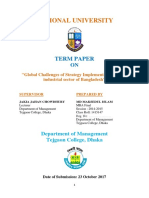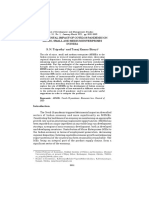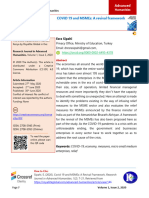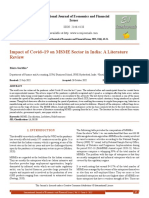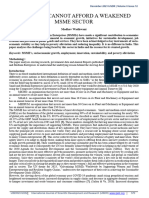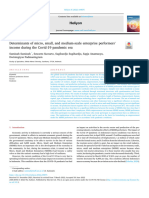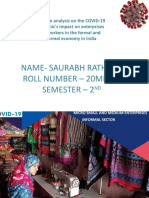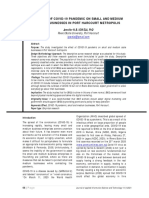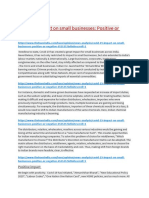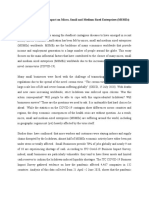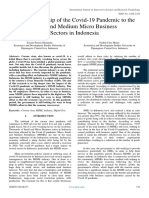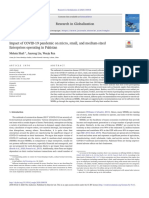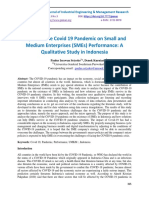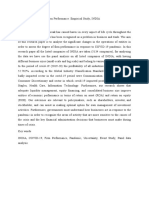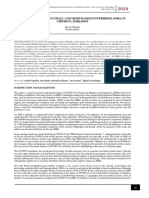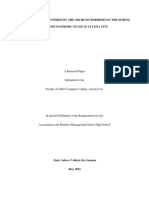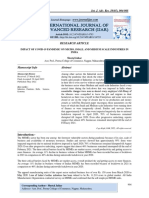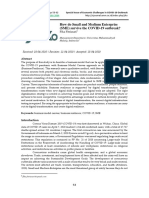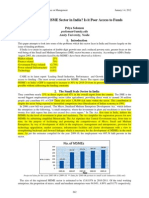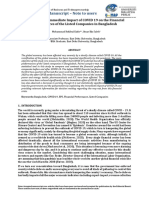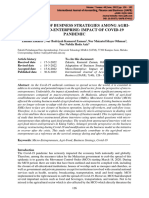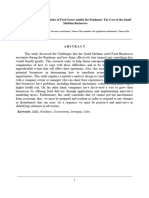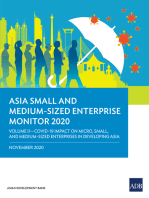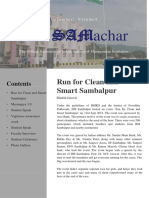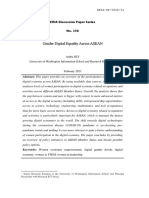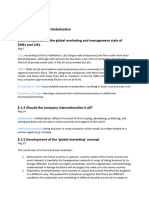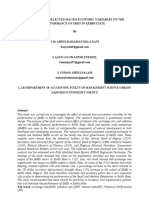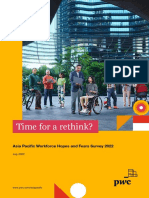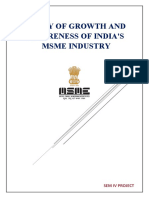Professional Documents
Culture Documents
MSMEs: An Analysis of The Covid-19 Epidemic, Financial Damage, and MSMEs Recovery
MSMEs: An Analysis of The Covid-19 Epidemic, Financial Damage, and MSMEs Recovery
Original Title
Copyright
Available Formats
Share this document
Did you find this document useful?
Is this content inappropriate?
Report this DocumentCopyright:
Available Formats
MSMEs: An Analysis of The Covid-19 Epidemic, Financial Damage, and MSMEs Recovery
MSMEs: An Analysis of The Covid-19 Epidemic, Financial Damage, and MSMEs Recovery
Copyright:
Available Formats
Volume 9, Issue 1, January – 2024 International Journal of Innovative Science and Research Technology
ISSN No:-2456-2165
MSMEs: An Analysis of the Covid-19 Epidemic,
Financial Damage, and MSMEs Recovery
Afaque Siddiqui (Research scholar)1 ;Dr Varsha Rokade (Associate Professor)2
Department of Management Studies
Maulana Azad National Institute of Technology
Bhopal, India
Abstract:- In developing countries like India, the role of Services Tax major contribution to the enhancement of the
micro, small, and medium enterprises (MSMEs) is very MSME sector.
vital in the all around development of its people. As most
of the jobs are created by MSMEs in developing It will take the place of complicated taxes like VAT,
countries. However, the extraordinary pandemic Service tax, entry tax, and other indirect taxes. MSMEs assist
unleashed by Covid-19 has wreaked havoc on the MSMEs to financial growth of developing countries by getting
sector, crippling many of them and needing immediate innovations. As well as producing new investment and
action to resurrect them. The Covid-19 pandemic has employment possibilities. The Micro, Small, and Medium
posed a danger to the MEs (Micro Enterprises) sector, Enterprises Act of 2006 defines micro, small, and medium
and any restart will inevitably face insurmountable enterprises. The current study aims to determine the influence
challenges such as a lack of funds, a dispersed and of MSMEs in India. After the 1930s Great Depression, the
transitory staff, communication difficulties, supply-chain year 2020 is regarded as the worst in world economic history.
stalemate, halting of trade in goods routes, and so on. This According to the IMF and World Bank, most countries' GDP
paper is an attempt to analyze the significance of MSMEs per capita would be lower than in December 2019.
in the complete development of the Indian economy to
determine the magnitude of damage incurred in various Objectives and Methodology of the Study
sectors as a result of the breakout of the Covid-19
pandemic and to propose some beneficial solutions to To focus briefly on the importance of MSMEs in the
alleviate the difficulties using secondary data collected. development of the economy of India;
To assess the degree of losses incurred in various sectors
Keywords:- MSMEs, the Covid-19 Epidemic, Financial as a result of the breakout of the Covid-19 pandemic; and
Damage, and me Recovery To offer some beneficial ideas for the restoration of the
micro enterprise sector.
I. INTRODUCTION
The study made use of secondary data obtained
The Covid-19 outbreak also caused chaos on Indian primarily through access to many government “agencies”,
economy's diverse sectors, particularly SMEs. MSMEs are websites, policies, and programs, such as the printed Annual
said to be the backbone of the developing country, which was Survey Report, Journal articles, and handbooks.
nearly devasted during the COVID-19 pandemic the impact
of which can be felt in almost all the sectors Micro II. LITERATURE REVIEW
Enterprises (MEs) have made a significant contribution to the
economy of India in terms of job creation, regional According to Mills and McCarthy (2014), investigated
inequalities reduction, equitable economic growth, and both the recurrent influence of the depression on small
increased export potential. MEs are an important economic businesses and credit access, as well as various structural
sector because they are an essential part of the product supply concerns that are impeding the complete recovery of
chains. Before the COVID-19 epidemic, these firms produced commercial bank markets for short-term loans. Small trades
roughly 30% of the country's GDP, 40% to 50% of exports, were hit hard by the expulsion, contributing to more than 60%
and then helped nearly 114 million people, or about 30% of of all employment losses, as the crisis wreaked havoc on the
the gross workers. In the non-agricultural sector, there were banking system, particularly small enterprises.
around 63 million unincorporated MEs, most of whom were
micro-enterprises within the unorganized sector" (EPW, MSMEs, according to Chandraiah and Vani (2014), face
2020). a variety of challenges, including productivity loss, an
inaccessibility to banking and loans, infrastructural issues,
The increase in the expansion of the MSME sector reversed tariff structures and availability of raw materials,
should be the emphasis of the Goods and Services Tax. With manufacturing equipment obsolescence, marketing issues, a
the advent of the Goods and Services Tax, SMEs are excluded lack of skilled workforce, extreme competitive pressure, and
first from the country's services tax. Advantages include ease late payment. With low ability to recover, these businesses
of doing business and its growth. Playing with the Goods and find it difficult to take risks and deal with competition, which
IJISRT24JAN876 www.ijisrt.com 633
Volume 9, Issue 1, January – 2024 International Journal of Innovative Science and Research Technology
ISSN No:-2456-2165
is due to the result of internal and external market dynamics III. COVID-19 PANDEMIC NEGATIVE IMPACT
and might risk expected profits. ON MSMEs
According to FICCI (2015), the largest hurdle for Indian The catastrophic pandemic produced by COVID-19 has
MSMEs to develop, create, and produce the jobs has been resulted in massive losses in the MEs sector, with a lot of
access to capital. Small and medium enterprises (SME) credit them disabled or on the edge of extinction. In a poll
ever has assisted firms in meeting all of their business needs performed by All India Manufacturers Organization (AIMO,
that arise along the way without a problem. Credit control is 2020) on micro, small and medium firms (MSMEs), 35
essential in the long and good run of the firm, but it is percent of MSMEs, the majority of which are self-employed,
especially necessary in SMEs, as the degree of risk of believe their businesses have little hope of recovery and have
bankruptcy is much higher. begun shutting down operations. MSMEs have been struck
particularly hard by the COVID-19 pandemic lockdown,
According to Singh and Wasdani (2016), knowing the which has resulted in the interruption and closure of their
capital lifespan of a small company is relevant here in case of production plants, bringing economic activity to a halt.
MSMEs as they expand through personal loans, self-equity,
and either short- and long-term loans. The challenges also According to Roy (2020), as the employment provided
being experienced by them in obtaining financing, such as by cloth manufacturing units in the export sector is nearly
difficulties in obtaining collateral, hectic loan application 12.9 million and in them most of the workers (70%) are
processing times, a lack of awareness of various plans, and women. From March 2020 to May 2020 they sustain a loss of
other obstacles in determining the proper solution. Rs 150 crore due to the COVID-19 Pandemic.
As per the Annual Report (2017-18), of the Government As per the (Financial Express 2020) a loss of nearly Rs
of India provides an overview and performance of the MSME 35000 crore in the snacks and sweet industry of India.The
sector, as well as major findings from the NSS in 73rd round world market has been gripped by the COVID-19 Pandemic
survey on MSMEs during (2015-16), legal entities, as well as cost India's leather firms $1.5 billion in exports. Except for
other authorities under the MSME Ministry. The cluster the leather premises in Kolkata and Unnao (Uttar Pradesh),
development approach has been chosen by the Ministry as a which got clearance to re-operate, the country's leather
significant strategy for improving the efficiency and clusters were shuttered. The nationwide lockdown caused by
competitiveness in MSEs as well as cooperative in the the pandemic has a substantial short-term volume impact on
country. the cement business, with volumes expected to drop by 35-
40% in March 2020 based on present conditions. As a result
As per UK Sinha-led RBI Committee's report (2019), of disruptions in the worldwide supply chain and normal
recommended a stressed asset fund of Rs. 5,000 crores for operations, important sectors like electronics, vehicles,
domestic micro, small, and medium companies, among other entertainment, transportation,, and exports were in danger.
things (MSMEs). The development of a small value fund will The value of the Covid-19 shutdown is estimated to be US$
be organized to support units, as a help to small enterprises 120 billion (almost Rs. 9 lakh crore).
affected by demonetization, Goods and Services Tax (GST),
and a continuous cash. Money will go toward rescuing Wage payments to employees have grown nearly
MSMEs that have become non-performing assets (NPA) due unmanageable. Electricity, rent, and interest are all fixed
to changes in the external environment. costs that should be met. The company's working capital has
been depleted. It's easier said than done to restart production.
The aforesaid analysis indicates that, while several Although the devastating pandemic has impacted all
studies on the MSMEs sector have been undertaken, research industries, the MEs sector would be hit especially hard by the
on the effect the Covid-19 epidemic over MSMEs and, countrywide lockdown's diminished cash flow. The removal
challenges of getting back to normal position is exceptionally of migrant labor, limits on access to raw materials,
restricted. disruptions to exports and imports, and extensive travel
limitations, as well as the shutdown of malls, hotels, theatres,
Kumari (2017), stated that the Goods and Services Tax and academic facilities, have all harmed their supply chain.
will have an influence on working capital requirements,
financing costs, and pricing policy for small and medium In construction activities, there was almost complete
businesses. In the long run, the goods and services tax is shutdown for two weeks. During the 15-day shutdown on
expected to assist micro, small, and medium businesses. March 20, the loss faced by Mumbai Metropolitan Region
Mishra (2020), recommends taking significant policy amounts between (Rs. 5050 to Rs 6500 crore), with a “1/4"
actions to ensure long-term growth of the economy. He percent drop in property registrations. Between January 1 and
predicts a decline in FDI and capital, as well as far-reaching March 15, 2021, the region only managed 9,300 home
consequences for local businesses and multinational registrations, compared to 12,800, in the 1st quarter of 2019.
corporations.
IJISRT24JAN876 www.ijisrt.com 634
Volume 9, Issue 1, January – 2024 International Journal of Innovative Science and Research Technology
ISSN No:-2456-2165
The lower and middle-income housing market has been sector, identifying enterprises in desperate need of finance
severely damaged, as its viability is dependent on large and those most affected by the new crisis would be difficult.
crowds and foot traffic. Some of the most eagerly anticipated Due to lack of resources the government was unable to extent
project releases have been further delayed, while others have the duration of lockdown as government cannot completely
been cancelled. The situation for ongoing initiatives has disrupt the supply chain. A delay in the GST returns was
become similarly bleak. The loss in the IT sector is projected permitted by the government from February to April which
to be in billions of dollars monthly losses. Rs. 15-17 lakh in further extended to June 2020 without any interest
revenue and Rs. 15 lakh thousands each month. Indian
software services organizations like Tata Consultancy The findings show that GST revenue fell drastically and
Services and Infosys rose to popularity by offering low-cost was distributed unevenly in the months after the lockdown
solutions to common computer problems to Western clients. declaration. April and May 2020 saw the lowest GST revenue
They rose to prominence in many worldwide corporations collections, with shortfalls of Rs. 81,571 crores and Rs.
throughout time. Ascent HR, on the other hand, believes that 38,280 crores, respectively, compared to the pre-lockdown
the shutdown situation has been hampered. It has placed a announcement period. With the relaxation of lockdown
significant load on the industry, forcing it to adopt a new measures and the resumption of economic activity after
innovative way of redefining work practices. To help September 2020, revenue collection will increase and GST
minimize the obstacles, the Indian government announced revenue distribution will remain stable.
and then implemented Prime Minister Garib Kalyan Yojna of
Rs 1.7 Lakh Crore as an immediate relief measure. Micro, small, and medium-sized businesses benefit
from the single tax idea that underpins the Goods and
As of Keelery (2020), the government relief is nearly Rs Services Tax. A Goods and Services Tax would result in
1.7 Lakh Crore and a package of worth 5% of GDP is also increased production, job opportunities, economic
provided. In the financial year of 2019-20 it is estimated that development, and national progress. MSMEs benefit from the
110 million people were employed in 63 million MSMEs Goods and Services Tax. The impact on MSMEs will be
firms throughout the country. There is lack of employment in beneficial. The Goods and Services Tax alleviates the burden
rural areas as compared to cities. on both producers and end users, as well as offering the
benefit of an input tax credit. This will make the federal
IV. RECOMMENDATIONS AND FINDINGS government financially healthy, which will aid in the
economy's overall balanced growth.
Based on the foregoing conversations, we found that
financial as well as social consequences of the Covid-19 V. CONCLUSION
epidemic would be more severe in the coming time unless we
devise an effective plan to get back the position and bring The COVID-19 pandemic has undeniably inflicted
economy on normal track. The economy's negative severe damage on the micro, small, and medium enterprises
consequences looming large, government intervention and (MSMEs) sector in India, disrupting various industries and
relief measures were urgently needed to limit harm to causing widespread economic challenges. The MSMEs
industry, the business, and the livelihoods of many people. As considered the backbone of the developing country, faced
a result, we can propose certain policy steps that can be unprecedented hurdles such as financial losses, supply chain
adopted to avert an unusual pandemic catastrophe. In the lack disruptions, communication difficulties, and workforce
of a clear line among business and personal money, it is instability. The repercussions were felt across sectors, from
possible that business excess will be utilized by the manufacturing and exports to construction and services.
entrepreneurs to meet their personal needs, hurting the
business's growth and viability. Before lending, it is This paper highlights the crucial role MSMEs play in
necessary to determine the possible returns on an investment. the overall development of the Indian economy, emphasizing
Furthermore, continuous monitoring and assistance support their contributions to job creation, regional development, and
for entrepreneurs is required to ensure that their business economic growth. The study underscores the immediate need
processes run smoothly. It is critical to gain access to the for focused attention and effective policy measures to
entrepreneur's payment capacity. As there is the issue of non- resurrect the MSME sector, which has suffered immensely
availability throughout the year, payments and cash inflows during the pandemic.
in the firm might assist entrepreneurs in successfully
managing their enterprises. The recommendations put forth include government
intervention, relief measures, and policy steps aimed at
Aside from these additional tax deductions, there is a mitigating the impact of the crisis. Addressing financial and
need to set aside additional money specifically for MEs to social consequences, supporting entrepreneurs, and ensuring
allow them to live. Industry groups have been asking for a smooth business operations are essential components of the
stimulus package worth 4% to 5% of GDP. It is proposed strategies. The implementation of measures such as
unquestionably necessary to support the MEs industry, not additional tax deductions, stimulus packages, and support for
only for narrow alleviation, but also for middle- and long- GST compliance is suggested to facilitate the recovery of
term development and resurrection. However, because MSMEs and, consequently, the broader Indian economy. In
MSMEs are distributed among numerous industries and essence, the revival of the MSME sector is imperative for the
different part of states, and operate mostly in the informal holistic recovery of the Indian economy post the Covid-19
IJISRT24JAN876 www.ijisrt.com 635
Volume 9, Issue 1, January – 2024 International Journal of Innovative Science and Research Technology
ISSN No:-2456-2165
pandemic, necessitating concerted efforts from policymakers,
industry stakeholders, and the government.
REFERENCES
[1]. Chandraiah, M., & Vani, R. (2014). The prospects and
problems of MSMEs sector in India: An analytical
study. International Journal of Business &
Management Invention, 3(8), 27-40.
[2]. FICCI. (2015). MSMEs: Towards a sustainable
growth. Mumbai: Resurgent India Ltd. Retrieved from
http://ficci.in/spdocument/23063/MSME-
Towardssustainable- development.pdf.
[3]. KPMG in India and CII (2016). The new wave Indian
MSME- An action agenda for growth. Retrieved from
https://assets.kpmg/content/dam/kpmg/pdf/2016/03/.
[4]. Singh, C., & Wasdani, K. P. (2016). Finance for
micro, small and medium enterprises in India: Sources
and challenge. ADBI working paper 581. IIM
Bangalore Publications.
[5]. Government of India (2018). Annual Report 2017-18.
New Delhi: Ministry of Micro, Small and Medium
Enterprises.
[6]. Keelery, S. (2020, May 19). Number of employees at
MSMEs in India financial year 2019. Statista The-
new-wave-Indian-MSME.pdf
[7]. K., & Rampal, J. (2020). The COVID-19 pandemic
and food insecurity: A viewpoint on India. World
Development, 135, 2019–2021.
https://doi.org/10.1016/j.worlddev.2020.105068
[8]. Editorial (2020, May 02). Rescuing micro, small and
medium enterprises. Economic and Political Weekly,
55(18).
[9]. Pandey, R. A. P. (2020). Covid-19 and MSMEs: The
‘identification’ problem. Ideas for India for More
Evidence Based Policy. Retrieved from https://
www.ideasforindia.in/topics/macroeconomics/covid-
19-and-the-msmesector-the-identification-
problem.html
[10]. S. (2020, June 19). First to be hit by the pandemic, this
sector will take years to make up for the losses. The
Economic Times. Retrieved from https://
economictimes.indiatimes.com/small-biz/sme-
sector/first-to-be-hit-by-thepandemic- this-sector-
will-take-years-to-make-up-for-the-losses/
articleshow/76456729.cms.
[11]. Economic Times. (2020, March 27). FM Nirmala
Sitharaman announces Rs 1.7 lakh crore relief
package for poor. The Economic Times. Retrieved
from https://economictimes.indiatimes.com/news/
economy/policy/fm-nirmalasitharaman-announces-
rs-1-7-lakh-crore-relief-package-for-poor/
articleshow/74825054.
IJISRT24JAN876 www.ijisrt.com 636
You might also like
- MSME DeclarationDocument1 pageMSME DeclarationpavanNo ratings yet
- National University: Term PaperDocument31 pagesNational University: Term PaperMoksedul Momin80% (5)
- Detrimental Impact of Covid-19 Pandemic On Micro, Small and Medium Enterprises in India S. N. Tripathy and Tanuj Kumar BisoyiDocument10 pagesDetrimental Impact of Covid-19 Pandemic On Micro, Small and Medium Enterprises in India S. N. Tripathy and Tanuj Kumar BisoyiHashmita MistriNo ratings yet
- 146-Article Text-606-4-10-20200627Document15 pages146-Article Text-606-4-10-20200627Rey John BorjeNo ratings yet
- Challenges To MSME During Covid 19Document6 pagesChallenges To MSME During Covid 19robertphilNo ratings yet
- Group3 ROLDocument12 pagesGroup3 ROLVicente BerdanNo ratings yet
- A Study On The Impact of The COVID-19 Crisis On The Indian Micro, Small and Medium EnterprisesDocument56 pagesA Study On The Impact of The COVID-19 Crisis On The Indian Micro, Small and Medium EnterprisesMansiNo ratings yet
- A Study On Impact of Covid - 19 On Msmes in IndiaDocument4 pagesA Study On Impact of Covid - 19 On Msmes in IndiaJelly Anne MateoNo ratings yet
- Impact of Covid-19 On MSME Sector in India A LiterDocument7 pagesImpact of Covid-19 On MSME Sector in India A LiterHashmita MistriNo ratings yet
- IJSDR2312052Document10 pagesIJSDR2312052ShradhaNo ratings yet
- An Assessment of The Impact of Covid-19 On Small ADocument9 pagesAn Assessment of The Impact of Covid-19 On Small ACHIZELUNo ratings yet
- Chapter 1 Draft-Brosas, Cabug-Os, CayacoDocument20 pagesChapter 1 Draft-Brosas, Cabug-Os, CayacoAdrheyni Kyle Cabug-osNo ratings yet
- 1 s2.0 S240584402201163X MainDocument10 pages1 s2.0 S240584402201163X MainMuhimatul ainiNo ratings yet
- Report WritingDocument5 pagesReport Writingelisha.owais1000No ratings yet
- Name - Saurabh RathoreDocument11 pagesName - Saurabh RathoreSaurabh RathoreNo ratings yet
- The Impact of Covid-19 On Micro, Small, and Medium EnterprisesDocument5 pagesThe Impact of Covid-19 On Micro, Small, and Medium EnterprisesFakhrurrazi, SHI., M.Si Fakhrurrazi, SHI., M.SiNo ratings yet
- MSMEs Amidst The PandemicDocument8 pagesMSMEs Amidst The PandemicCARL ZEUS TOLENTINONo ratings yet
- COVID-19 and Indian Economy: Impact On Growth, Manufacturing, Trade and MSME SectorDocument25 pagesCOVID-19 and Indian Economy: Impact On Growth, Manufacturing, Trade and MSME SectorVipul ManglaNo ratings yet
- The Impact of Covid-19 On Micro, Small, and Medium EnterprisesDocument5 pagesThe Impact of Covid-19 On Micro, Small, and Medium Enterprisesfilm dicky DickyNo ratings yet
- Effects of Covid-19 Pandemic On Small and Medium Scale Businesses in Port Harcourt MetropolisDocument8 pagesEffects of Covid-19 Pandemic On Small and Medium Scale Businesses in Port Harcourt MetropolisEzekiel FavourNo ratings yet
- Covid-19 Impact On Small Businesses: Positive or Negative?Document3 pagesCovid-19 Impact On Small Businesses: Positive or Negative?Keerthi LankaNo ratings yet
- Covid-19 Impact On MSMEsDocument5 pagesCovid-19 Impact On MSMEsLokeraj RupnarainNo ratings yet
- The Relationship of The Covid-19 Pandemic To The Small and Medium Micro Business Sectors in IndonesiaDocument4 pagesThe Relationship of The Covid-19 Pandemic To The Small and Medium Micro Business Sectors in IndonesiaInternational Journal of Innovative Science and Research TechnologyNo ratings yet
- Covid 19 Impact On Micro Small Industries of Pak (Elsevier) 2020Document14 pagesCovid 19 Impact On Micro Small Industries of Pak (Elsevier) 2020hafiza arishaNo ratings yet
- 406-Article Text-952-1-10-20220910Document10 pages406-Article Text-952-1-10-20220910Aditya VioNo ratings yet
- Quad Helix DocumentDocument50 pagesQuad Helix DocumentHendry SuhardimanNo ratings yet
- Impact of Covid-19 On Startups: Ketan Baid, Shashank Sethi, Aman SharmaDocument6 pagesImpact of Covid-19 On Startups: Ketan Baid, Shashank Sethi, Aman SharmaKETAN BAIDNo ratings yet
- Small Businesses and Their Challenges During COVID 19 Pandemic in Developing Countries: in The Case of EthiopiaDocument14 pagesSmall Businesses and Their Challenges During COVID 19 Pandemic in Developing Countries: in The Case of EthiopiaRegor AguinaldoNo ratings yet
- Blah.. BlahhDocument95 pagesBlah.. BlahhBhalaNo ratings yet
- IMPACT OF COVID-19 ON SMALL AND MEDIUM-SIZED ENTERPRISES (SMEs) INDocument10 pagesIMPACT OF COVID-19 ON SMALL AND MEDIUM-SIZED ENTERPRISES (SMEs) INazael munadiyan100% (2)
- Challenges Encountered by The Micro-Enterprises in The During and Post-Pandemic Stage in Lucena CityDocument40 pagesChallenges Encountered by The Micro-Enterprises in The During and Post-Pandemic Stage in Lucena CityJhon larry DalisayNo ratings yet
- Impact of Covid-19 On MSMES in India and Strategies For Revival of MSMES Post Covid-19Document3 pagesImpact of Covid-19 On MSMES in India and Strategies For Revival of MSMES Post Covid-19International Journal of Innovative Science and Research TechnologyNo ratings yet
- JOItmC 08 00100 v3Document15 pagesJOItmC 08 00100 v3Omar AlshamestiNo ratings yet
- The Impacts of COVID 19 On Small and Medium Enterprises: September 2020Document11 pagesThe Impacts of COVID 19 On Small and Medium Enterprises: September 2020Hella Mae RambunayNo ratings yet
- Impact of Covid-19 Pandemic On Micro, Small and Medium Scale Industries in IndiaDocument5 pagesImpact of Covid-19 Pandemic On Micro, Small and Medium Scale Industries in IndiaIJAR JOURNALNo ratings yet
- COVID-19: Small and Medium Enterprises Challenges and Responses With Creativity, Innovation, and EntrepreneurshipDocument6 pagesCOVID-19: Small and Medium Enterprises Challenges and Responses With Creativity, Innovation, and EntrepreneurshipfozNo ratings yet
- 220 - PSU - Supporting MSMEs Digitalization Amid COVID-19Document9 pages220 - PSU - Supporting MSMEs Digitalization Amid COVID-19Francis Loie RepuelaNo ratings yet
- Covid-19 Pandemic The Effectiveness of Utilizing Micro Business Productive Assistance (BPUM) For MSMEsDocument27 pagesCovid-19 Pandemic The Effectiveness of Utilizing Micro Business Productive Assistance (BPUM) For MSMEsIshak SlametNo ratings yet
- IIM - Literature Review Paper - Impact of Covid-19 On MSME of India.Document18 pagesIIM - Literature Review Paper - Impact of Covid-19 On MSME of India.Nili ShahNo ratings yet
- UNIDO COVID19 Assessment Bangladesh FINALDocument31 pagesUNIDO COVID19 Assessment Bangladesh FINALFatima SadiaNo ratings yet
- Angombe2021 Final ProjectDocument48 pagesAngombe2021 Final Projectshimuooshili laviniaNo ratings yet
- UNIDO COVID19 Assessment - Malaysia - FINALDocument34 pagesUNIDO COVID19 Assessment - Malaysia - FINALloganNo ratings yet
- Impact of COVIDDocument29 pagesImpact of COVIDMalkOo AnjumNo ratings yet
- Impact of Covid 19 On MSMEsDocument24 pagesImpact of Covid 19 On MSMEsBellapu Durga vara prasad100% (2)
- Smes Strategy Survival During Pandemic 6Document10 pagesSmes Strategy Survival During Pandemic 6sita deliyana FirmialyNo ratings yet
- 208 - Umer - What Ails The MSME Sector in India Is It Poor Access To FundsDocument7 pages208 - Umer - What Ails The MSME Sector in India Is It Poor Access To FundsnomadisnoNo ratings yet
- The Impact of Covid-19 Pandemic Among Small Business EntitiesDocument12 pagesThe Impact of Covid-19 Pandemic Among Small Business EntitiesNieee ChanNo ratings yet
- Aditya EDE ProjectDocument19 pagesAditya EDE ProjectOnly Entertainment 2ndNo ratings yet
- Covid Assigment Understanding BusinessDocument11 pagesCovid Assigment Understanding BusinessHiyam HishamNo ratings yet
- In Press, Accepted Manuscript - Note To UsersDocument9 pagesIn Press, Accepted Manuscript - Note To UsersSabbir AhmmedNo ratings yet
- Revisiting Talent Management Practices in A Pandemic Driven Vuca Environment - A Qualitative Investigation in The Indian It IndustryDocument6 pagesRevisiting Talent Management Practices in A Pandemic Driven Vuca Environment - A Qualitative Investigation in The Indian It Industrydevi 2021100% (1)
- Individual Case Study Ret542 Siti Nurfaizah 2021393321Document16 pagesIndividual Case Study Ret542 Siti Nurfaizah 2021393321Siti NurfaizahNo ratings yet
- Adaptation of Business Strategies Among Agrifood Micro-Enterprise Impact of Covid-19Document7 pagesAdaptation of Business Strategies Among Agrifood Micro-Enterprise Impact of Covid-19Jeslyn TanNo ratings yet
- Impact of COVID-19 On Small and Medium Enterprises (SMEs) in BangladeshDocument4 pagesImpact of COVID-19 On Small and Medium Enterprises (SMEs) in BangladeshMd Farhad Hossain AlviNo ratings yet
- Assessment On Operational Responsiveness of Small Business Entrepreneurs During CoVid 19 PandemicDocument74 pagesAssessment On Operational Responsiveness of Small Business Entrepreneurs During CoVid 19 PandemicMoneyed MelosantosNo ratings yet
- Final Research PaperDocument16 pagesFinal Research Papersophiamonique.colinaNo ratings yet
- Economic Impact of COVID-19 Lock Down On Small Medium Enterprise (Smes) in Lagos StateDocument7 pagesEconomic Impact of COVID-19 Lock Down On Small Medium Enterprise (Smes) in Lagos StateresearchparksNo ratings yet
- Ijbel26.isu1 210Document8 pagesIjbel26.isu1 210Sri HandayaniNo ratings yet
- Manuscript Research 1Document20 pagesManuscript Research 1Kaye Jay EnriquezNo ratings yet
- Plagiarism Scan Report: Exclude Url: NoneDocument2 pagesPlagiarism Scan Report: Exclude Url: NoneSaurabh SinghNo ratings yet
- Asia Small and Medium-Sized Enterprise Monitor 2020: Volume II: COVID-19 Impact on Micro, Small, and Medium-Sized Enterprises in Developing AsiaFrom EverandAsia Small and Medium-Sized Enterprise Monitor 2020: Volume II: COVID-19 Impact on Micro, Small, and Medium-Sized Enterprises in Developing AsiaNo ratings yet
- Effect of the Covid Pandemic on Current Economic Trends : Career, Money Management and Investment StrategiesFrom EverandEffect of the Covid Pandemic on Current Economic Trends : Career, Money Management and Investment StrategiesNo ratings yet
- Exploring the Potential Advantages of Traditional Therapies in Autoimmune Blistering Illnesses: A Comprehensive Review and Analysis, ResearchDocument12 pagesExploring the Potential Advantages of Traditional Therapies in Autoimmune Blistering Illnesses: A Comprehensive Review and Analysis, ResearchInternational Journal of Innovative Science and Research TechnologyNo ratings yet
- Seasonal Variation and Distribution Patterns of Endophytic Community in Withania somniferaDocument7 pagesSeasonal Variation and Distribution Patterns of Endophytic Community in Withania somniferaInternational Journal of Innovative Science and Research TechnologyNo ratings yet
- Unlocking Sentiments: Enhancing IOCL Petrol Pump ExperiencesDocument8 pagesUnlocking Sentiments: Enhancing IOCL Petrol Pump ExperiencesInternational Journal of Innovative Science and Research TechnologyNo ratings yet
- Skin Disease Detection and Remedial SystemDocument7 pagesSkin Disease Detection and Remedial SystemInternational Journal of Innovative Science and Research TechnologyNo ratings yet
- Development of Smart Ground Fault Location Model for Radial Distribution SystemDocument14 pagesDevelopment of Smart Ground Fault Location Model for Radial Distribution SystemInternational Journal of Innovative Science and Research TechnologyNo ratings yet
- Design and Development of Multi-Featured Medical StretcherDocument4 pagesDesign and Development of Multi-Featured Medical StretcherInternational Journal of Innovative Science and Research TechnologyNo ratings yet
- EmoConnect: Nurturing Trust and Relationship Bonds in Alzheimer’s ConversationsDocument3 pagesEmoConnect: Nurturing Trust and Relationship Bonds in Alzheimer’s ConversationsInternational Journal of Innovative Science and Research TechnologyNo ratings yet
- Smart and Secure Home with ChatbotDocument9 pagesSmart and Secure Home with ChatbotInternational Journal of Innovative Science and Research TechnologyNo ratings yet
- Firm Size as a Mediator between Inventory Management Andperformance of Nigerian CompaniesDocument8 pagesFirm Size as a Mediator between Inventory Management Andperformance of Nigerian CompaniesInternational Journal of Innovative Science and Research TechnologyNo ratings yet
- Reading Intervention Through “Brigada Sa Pagbasa”: Viewpoint of Primary Grade TeachersDocument3 pagesReading Intervention Through “Brigada Sa Pagbasa”: Viewpoint of Primary Grade TeachersInternational Journal of Innovative Science and Research TechnologyNo ratings yet
- Application of Plant Growth Promoting Rhizobacteria on Vegetative Growth in Chili Plants (Capsicum frutescens L.)Document7 pagesApplication of Plant Growth Promoting Rhizobacteria on Vegetative Growth in Chili Plants (Capsicum frutescens L.)International Journal of Innovative Science and Research TechnologyNo ratings yet
- Preparation and Identification of Magnetic Iron Nanoparticle based on a Natural Hydrogel and its Performance in Targeted Drug DeliveryDocument17 pagesPreparation and Identification of Magnetic Iron Nanoparticle based on a Natural Hydrogel and its Performance in Targeted Drug DeliveryInternational Journal of Innovative Science and Research TechnologyNo ratings yet
- A Study to Assess the Knowledge Regarding Teratogens Among the Husbands of Antenatal Mother Visiting Obstetrics and Gynecology OPD of Sharda Hospital, Greater Noida, UpDocument5 pagesA Study to Assess the Knowledge Regarding Teratogens Among the Husbands of Antenatal Mother Visiting Obstetrics and Gynecology OPD of Sharda Hospital, Greater Noida, UpInternational Journal of Innovative Science and Research TechnologyNo ratings yet
- Application of Game Theory in Solving Urban Water Challenges in Ibadan-North Local Government Area, Oyo State, NigeriaDocument9 pagesApplication of Game Theory in Solving Urban Water Challenges in Ibadan-North Local Government Area, Oyo State, NigeriaInternational Journal of Innovative Science and Research TechnologyNo ratings yet
- On the Development of a Threat Driven Model for Campus NetworkDocument14 pagesOn the Development of a Threat Driven Model for Campus NetworkInternational Journal of Innovative Science and Research TechnologyNo ratings yet
- Global Warming Reduction Proposal AssessmentDocument6 pagesGlobal Warming Reduction Proposal AssessmentInternational Journal of Innovative Science and Research TechnologyNo ratings yet
- Exploring the Post-Annealing Influence on Stannous Oxide Thin Films via Chemical Bath Deposition Technique: Unveiling Structural, Optical, and Electrical DynamicsDocument7 pagesExploring the Post-Annealing Influence on Stannous Oxide Thin Films via Chemical Bath Deposition Technique: Unveiling Structural, Optical, and Electrical DynamicsInternational Journal of Innovative Science and Research TechnologyNo ratings yet
- PHREEQ C Modelling Tool Application to Determine the Effect of Anions on Speciation of Selected Metals in Water Systems within Kajiado North Constituency in KenyaDocument71 pagesPHREEQ C Modelling Tool Application to Determine the Effect of Anions on Speciation of Selected Metals in Water Systems within Kajiado North Constituency in KenyaInternational Journal of Innovative Science and Research TechnologyNo ratings yet
- Detection of Phishing WebsitesDocument6 pagesDetection of Phishing WebsitesInternational Journal of Innovative Science and Research TechnologyNo ratings yet
- Mandibular Mass Revealing Vesicular Thyroid Carcinoma A Case ReportDocument5 pagesMandibular Mass Revealing Vesicular Thyroid Carcinoma A Case ReportInternational Journal of Innovative Science and Research TechnologyNo ratings yet
- Sustainable Energy Consumption Analysis through Data Driven InsightsDocument16 pagesSustainable Energy Consumption Analysis through Data Driven InsightsInternational Journal of Innovative Science and Research TechnologyNo ratings yet
- Realigning Curriculum to Simplify the Challenges of Multi-Graded Teaching in Government Schools of KarnatakaDocument5 pagesRealigning Curriculum to Simplify the Challenges of Multi-Graded Teaching in Government Schools of KarnatakaInternational Journal of Innovative Science and Research TechnologyNo ratings yet
- Vertical Farming System Based on IoTDocument6 pagesVertical Farming System Based on IoTInternational Journal of Innovative Science and Research TechnologyNo ratings yet
- Consistent Robust Analytical Approach for Outlier Detection in Multivariate Data using Isolation Forest and Local Outlier FactorDocument5 pagesConsistent Robust Analytical Approach for Outlier Detection in Multivariate Data using Isolation Forest and Local Outlier FactorInternational Journal of Innovative Science and Research TechnologyNo ratings yet
- Esophageal Melanoma - A Rare NeoplasmDocument3 pagesEsophageal Melanoma - A Rare NeoplasmInternational Journal of Innovative Science and Research TechnologyNo ratings yet
- The Impact of Music on Orchid plants Growth in Polyhouse EnvironmentsDocument5 pagesThe Impact of Music on Orchid plants Growth in Polyhouse EnvironmentsInternational Journal of Innovative Science and Research Technology100% (1)
- Review on Childhood Obesity: Discussing Effects of Gestational Age at Birth and Spotting Association of Postterm Birth with Childhood ObesityDocument10 pagesReview on Childhood Obesity: Discussing Effects of Gestational Age at Birth and Spotting Association of Postterm Birth with Childhood ObesityInternational Journal of Innovative Science and Research TechnologyNo ratings yet
- Osho Dynamic Meditation; Improved Stress Reduction in Farmer Determine by using Serum Cortisol and EEG (A Qualitative Study Review)Document8 pagesOsho Dynamic Meditation; Improved Stress Reduction in Farmer Determine by using Serum Cortisol and EEG (A Qualitative Study Review)International Journal of Innovative Science and Research TechnologyNo ratings yet
- Investigating Non-Newtonian Fluid Behavior in Hydrocyclones Via Computational Fluid DynamicsDocument18 pagesInvestigating Non-Newtonian Fluid Behavior in Hydrocyclones Via Computational Fluid DynamicsInternational Journal of Innovative Science and Research TechnologyNo ratings yet
- Influence of Principals’ Promotion of Professional Development of Teachers on Learners’ Academic Performance in Kenya Certificate of Secondary Education in Kisii County, KenyaDocument13 pagesInfluence of Principals’ Promotion of Professional Development of Teachers on Learners’ Academic Performance in Kenya Certificate of Secondary Education in Kisii County, KenyaInternational Journal of Innovative Science and Research Technology100% (1)
- Indian Institute of Banking & Finance: Certificate Examination in SME Finance For BankersDocument8 pagesIndian Institute of Banking & Finance: Certificate Examination in SME Finance For BankerssatwinsNo ratings yet
- Impact of Covid-19 Pandemic On Indian Economy 2Document9 pagesImpact of Covid-19 Pandemic On Indian Economy 2Ayushi PatelNo ratings yet
- Classification of MSME in IndiaDocument3 pagesClassification of MSME in Indiaaishu patilNo ratings yet
- Erp Implementation of Ifrs For Smes: DissertationDocument68 pagesErp Implementation of Ifrs For Smes: DissertationGaurav Kumar Kureel100% (1)
- Guess Speaker ReactionDocument5 pagesGuess Speaker ReactionJohn TanNo ratings yet
- EDE - 22032 - Solved Manual Practical (AICTE)Document61 pagesEDE - 22032 - Solved Manual Practical (AICTE)Snehal SolankeNo ratings yet
- Mauritius Annex Budget 2023-2024Document92 pagesMauritius Annex Budget 2023-2024maail kaiserNo ratings yet
- Dhaka Chamber of CommerceDocument10 pagesDhaka Chamber of CommerceMoriom AkterNo ratings yet
- IIM SAMachar Volume IVDocument9 pagesIIM SAMachar Volume IVSwag keeperNo ratings yet
- Iso 50005 - 2021Document51 pagesIso 50005 - 2021Lilia LiliaNo ratings yet
- Economics, Management and Policies For Global ChallengesDocument8 pagesEconomics, Management and Policies For Global Challengesjayesh8.tsgNo ratings yet
- ICMA Pakistan E-Newsletter - March 2019 PDFDocument20 pagesICMA Pakistan E-Newsletter - March 2019 PDFMudassar GillaniNo ratings yet
- Gender Digital Equality Across ASEANDocument70 pagesGender Digital Equality Across ASEANmilrosebatilo2012No ratings yet
- Micro Small IndustriesDocument105 pagesMicro Small IndustriesYuppy KanalNo ratings yet
- Exim BankDocument17 pagesExim BankTrisan ShresthaNo ratings yet
- Investment Law For ReportersDocument19 pagesInvestment Law For ReportersJessica BernardoNo ratings yet
- Solutions for GST (5)Document54 pagesSolutions for GST (5)tannerushivakumar77No ratings yet
- Understanding Islamic Cooperatives Mechanisms For The Accessibility Promotion of Islamic Finance in MalaysiaDocument14 pagesUnderstanding Islamic Cooperatives Mechanisms For The Accessibility Promotion of Islamic Finance in MalaysiashabeerNo ratings yet
- Low Carbon and Energy Efficiency Initiatives For Philippine MsmesDocument20 pagesLow Carbon and Energy Efficiency Initiatives For Philippine Msmesrandolph cacachoNo ratings yet
- HARMONY - Permanent Dog Shelter Project, BulgariaDocument127 pagesHARMONY - Permanent Dog Shelter Project, BulgariaVasilena91% (11)
- Summary Chapter 1-8, Global Marketing 8th Edition (Svend Hollensen)Document31 pagesSummary Chapter 1-8, Global Marketing 8th Edition (Svend Hollensen)jantjekoenders1No ratings yet
- Establishment of A Pulse Processing IndustryDocument63 pagesEstablishment of A Pulse Processing Industryanoop_narayan100% (1)
- Innovation and Change Management in Small and Medium-Sized Manufacturing CompaniesDocument55 pagesInnovation and Change Management in Small and Medium-Sized Manufacturing CompaniesrnvvprasadNo ratings yet
- The Effect of Selected Macro-Economic Variables On The Performance of Smes in Kebbi StateDocument15 pagesThe Effect of Selected Macro-Economic Variables On The Performance of Smes in Kebbi StatesonyNo ratings yet
- Henry Ongori - Information and Communication Technologies Adoption in SMEs. Literature ReviewDocument12 pagesHenry Ongori - Information and Communication Technologies Adoption in SMEs. Literature ReviewAzwinNo ratings yet
- Asia Pacific Hopes and Fears Survey 2022 v2Document22 pagesAsia Pacific Hopes and Fears Survey 2022 v2ageNo ratings yet
- ProjectDocument55 pagesProjectKaran MokhaNo ratings yet
- 351-Article Text-1209-1-10-20201020Document12 pages351-Article Text-1209-1-10-20201020djanovicaNo ratings yet
